What is Flutter App Development and How Can It Benefit Your Business?
Wondering what is Flutter and could you use this cross-platform framework to create your next app? In this blog post we dive deep into the specs and features Flutter brings to the table and determine which businesses it will suit the most.
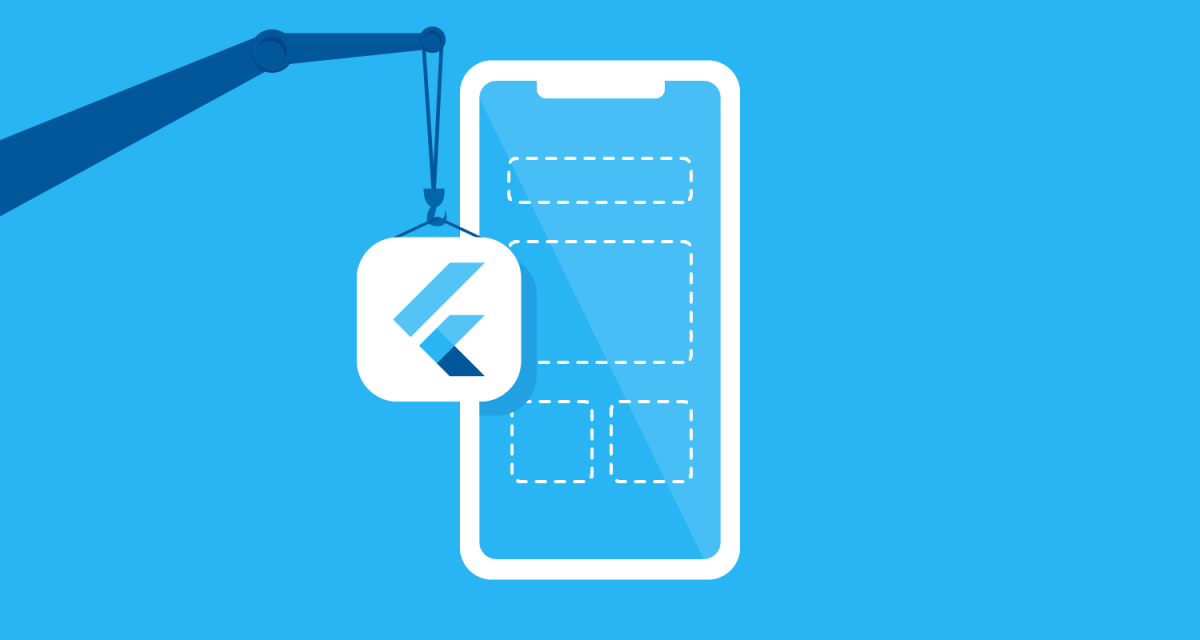
Table of contents
So, you want to build a mobile app. Perhaps, you’ve even settled for cross-platform development over natively compiled applications – great call! You may even lean towards React Native as it seems to be the best for your users. And yet everyone on the internet seems to be pushing Flutter apps these days.
Well, in a penny-wise market, businesses need quality without excessive cost. Flutter app development delivers. With one codebase for Android, iOS, and web, it saves on multiple platform costs. And if native apps are draining your wallet? Switching to Flutter can cut those maintenance bills.
In this article, you will find out:
- What is Flutter and how does it work? – From the basics to the nitty-gritty
- How can Flutter improve cross-platform app development?
- Which companies can benefit most from choosing Flutter?
Flutter vs. React Native
In all fairness – both Flutter and React Native are solid cross-platform frameworks for front-end development. Both are great for mobile applications. Both will give you access to iOS and Android apps. Both offer solid app performance and modern solutions.
Yet, each has its own benefits to bring to the table. In this article, we’re going to focus on Flutter apps, but if you want to learn more about React Native and other frameworks, some of these posts might come in handy:
You may also like:
And now, it’s about time we’ve clarified once and for all: what is Flutter and if it’s the right choice for your business and tech needs.
What is Flutter?
Flutter is an open-source UI (user interface) toolkit developed by Google for building natively compiled mobile, web, and desktop applications from a single codebase. It allows you to create beautiful and highly performant digital products with rich customizable widgets.
If you want some background, here are some key facts about Flutter:
- Flutter originated from Google and serves as the foundational technology for many of Google’s renowned products, such as Google Pay and Google Ads.
- Flutter was officially launched as an open-source project in May 2017, making it accessible to a broader community of developers. In December 2018, Flutter reached its first stable release.
- The framework initially targeted mobile platforms, particularly iOS and Android devices. It was created as an alternative to existing cross-platform development frameworks. Eventually, Flutter became more popular than its major competitor, React Native.
- As Flutter continues to gain popularity, its ecosystem flourishes. The abundance of packages, libraries, and tools continues to expand, providing developers with a rich pool of resources. This allows for faster app development by leveraging existing solutions.
- Flutter fosters a vibrant and collaborative community where developers can freely share knowledge, contributing to its continuous growth and enhancement.
- Many top apps are made with Flutter, including eBay Motors, Reflectly, Alibaba, Hamilton, Realtor.com, Square, Topline, Hookle, Birch Finance, Nubank, ING Bank Śląski (Poland), and Credit Agricole Bank Polska (Poland). Find some more Flutter apps that are currently in production or browse top Flutter apps and business stories.
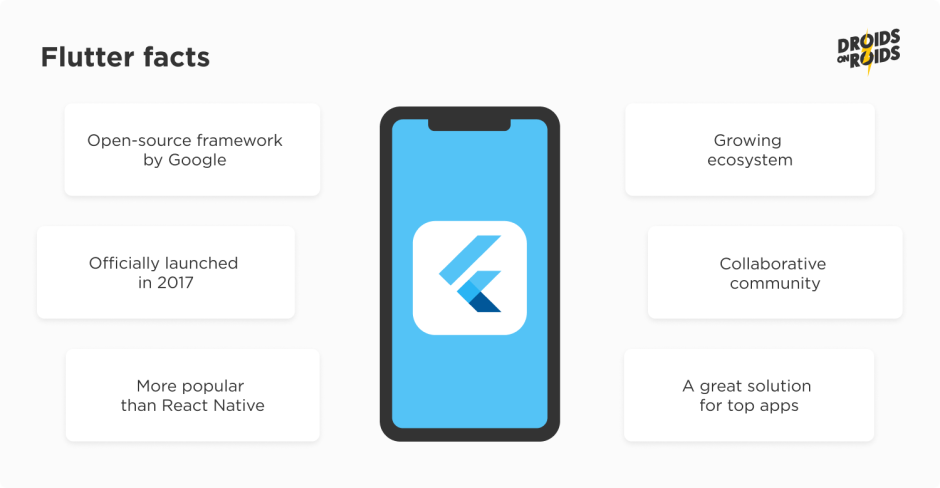
How does Flutter work?
Now is probably the right time to say that Flutter is not a programming language. Instead, it’s a mobile app SDK (software development kit) for cross-platform app development. It’s also often referred to as Flutter framework.
What is an SDK?
An SDK is like a ready-made kit for building apps. It’s one package you install, and it has all the tools you need, like a tool for turning code into an app, finding mistakes, and sometimes even a set of pre-made parts. It’s made to work with specific devices and systems. Developers use SDKs to add app features like ads and notifications easily.
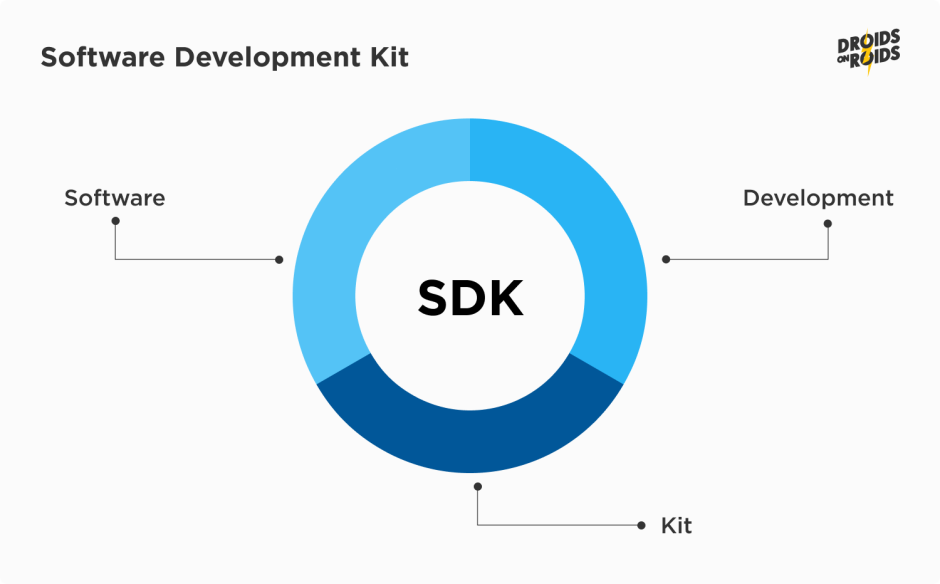
What are the architectural layers in Flutter SDK?
Flutter SDK is fully-fledged, providing a complete toolset for building apps. It has its own drawing engine for graphics, pre-built pieces called widgets to drop into your app, and tools for testing how everything works together. Let’s dive into its main parts and how they all work.
- Embedder
The embedder layer utilizes a platform-specific language (such as Java or Objective-C) to enable Flutter apps to run seamlessly on various operating systems. It acts as a bridge between the native machine code, the platform, and the Flutter engine, ensuring compatibility and smooth execution.
- Engine
Flutter’s heart is the Flutter engine, which is mainly written in C++. It’s like the backstage crew of a theater, handling all the groundwork for every Flutter app. Every time something changes, it draws all the visual elements of your app on the screen. It’s also the powerhouse that runs all of Flutter’s basic features, like creating graphics, arranging text, managing files and network activity, supporting accessibility, allowing add-ons, and running and compiling Dart, the language Flutter apps are written in.
- Framework
Within Flutter, the term “framework” usually refers to the collection of tools, libraries, and functionalities that Flutter provides to developers. This includes things like #widgets, which are the pre-made elements you can use and combine to build your app. It’s within this layer that the magic of reactive programming happens. our app can easily update in response to changes, such as a chat message appearing.
Further enriching the framework are the Material and Cupertino libraries. Think of them as themed toolkits: Material caters to Google-style designs, while Cupertino is tailored to Apple-inspired aesthetics. They enable the utilization of the basic components from the widget layer to craft an application that seamlessly blends into the Android or iOS environment.
In essence, the Flutter framework is engineered to streamline the process of crafting user interfaces that dynamically respond to events, such as user interactions, and maintain a uniform appearance across various platforms.
Below is an overview of Flutter’s architectural overview illustrated in the graphics. You can see how Flutter is built in general and how its design relates to your application.
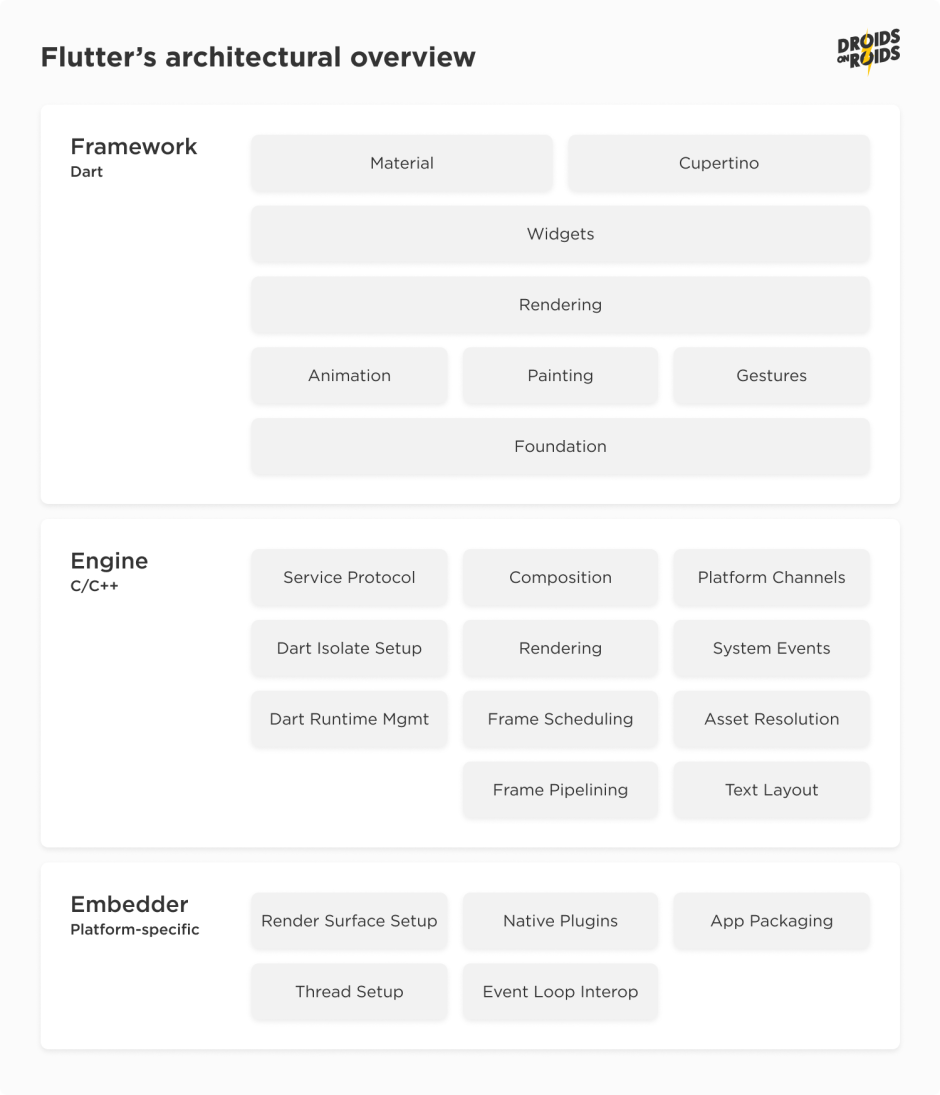
What programming language does Flutter use?
Flutter apps are written in the Dart language and extensively leverage its capabilities.
Dart programming language explained
Dart is a simple yet powerful language similar to Java or C++, making it a familiar territory for Java programmers. It’s flexible in how strictly it checks types, which also makes it beginner-friendly. Because of this unique transformation capability, Dart doesn’t need an extra translator (like a bridge) to talk to the device, unlike some other frameworks (such as React Native).
It is a vital ingredient that gives Flutter its unique flavor. Let’s see how.
- Dart supports both Ahead-of-Time (AOT) and Just-in-Time (JIT) compilation methods. In simpler terms, it can either prepare the code in advance (AOT), which makes programs load quicker, or it can prepare the code as it runs (JIT), giving more flexibility but slightly slower start-ups. Flutter cleverly uses JIT during the app development for faster testing and switches to AOT when the app is ready to launch for the best performance.
- Dart does not require XML files. Unlike Android development, where layout (appearance) and code are separated into XML and Java, respectively, Dart combines them. When it comes to Flutter, the layout is created using the widgets in the Dart
- Dart can talk directly to the device it runs on without the need for an intermediate bridge. Some other tools, like React Native, use a ‘bridge’ to connect the JavaScript with the device’s own widgets. These bridges can slow things down and make debugging trickier. Dart’s direct approach makes Flutter faster and more efficient than some of its rivals.
What are Flutter widgets?
In Flutter, widgets are the fundamental building blocks and the primary means of constructing user interfaces. Widgets define the application’s appearance, factoring in their current state and configuration.
Everything in Flutter, from simple buttons and text fields to complex layouts and animations, is represented as a widget. Naturally, there are numerous widgets to choose from. We can categorize them into 14 groups, each serving distinct roles within a Flutter application.
- Accessibility Widgets: for enhancing the app’s accessibility, making it more user-friendly.
- Animation and Motion Widgets: for bringing dynamic elements to the app by incorporating animations into other widgets.
- Assets, Images, and Icons Widgets: for managing visual assets such as images and icons.
- Async Widgets: for enabling async operations within the Flutter application.
- Basic Widgets: fundamental widgets necessary for any Flutter application development.
- Cupertino Widgets: iOS style widgets.
- Input Widgets: for handling user input in the Flutter application.
- Interaction Models Widgets: for managing touch events and navigation between different views in the app.
- Layout Widgets: for assisting in arranging other widgets on the screen as needed.
- Material Components Widgets: these primarily adhere to Google’s material design guidelines.
- Painting and Effects Widgets: for applying visual modifications to their children without altering their layout or shape.
- Scrolling Widgets: providing scrolling functionality to other non-scrollable widgets by default.
- Styling Widgets: managing the app’s theme, responsiveness, and sizing.
- Text Widgets: displaying text.
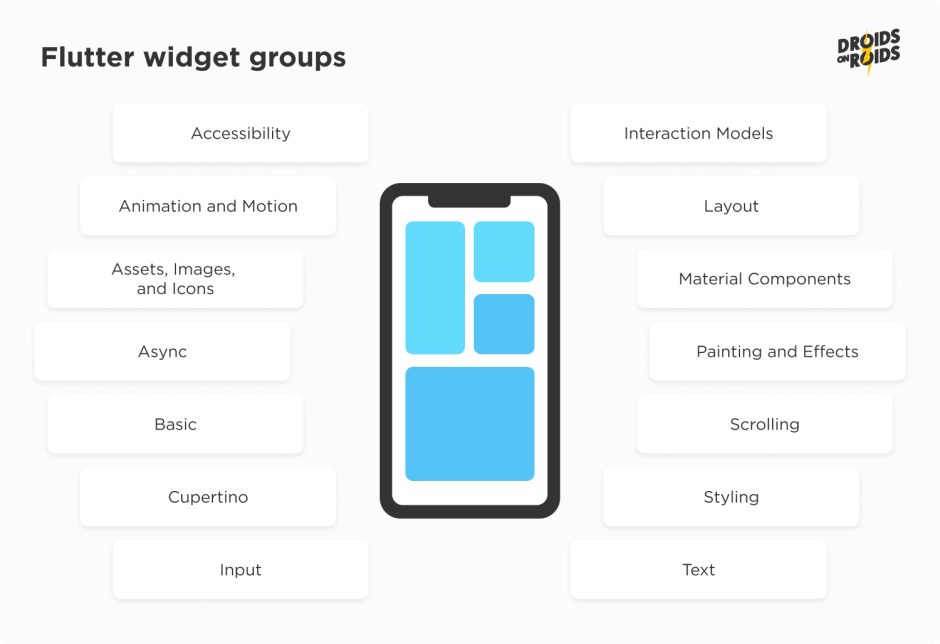
Apart from categories, we can divide widgets into two main types.
StatelessWidget: An immutable widget that does not change its internal state once created. It represents UI components that don’t require any dynamic updates. These stateless widgets are typically used for static elements, such as text labels, buttons, icons, or images. StatelessWidget widgets are defined by overriding the build method, which returns a widget tree representing the UI component’s structure.
StatefulWidget: A mutable widget that can change its internal state over time. It represents UI components that require dynamic updates or handle user interactions. StatefulWidget widgets consist of two classes: the widget class itself, which is immutable, and a corresponding state class that holds the mutable state. The state class is responsible for updating the widget in response to changes. The build method of the StatefulWidget is called whenever the widget needs to be rebuilt due to a state change.
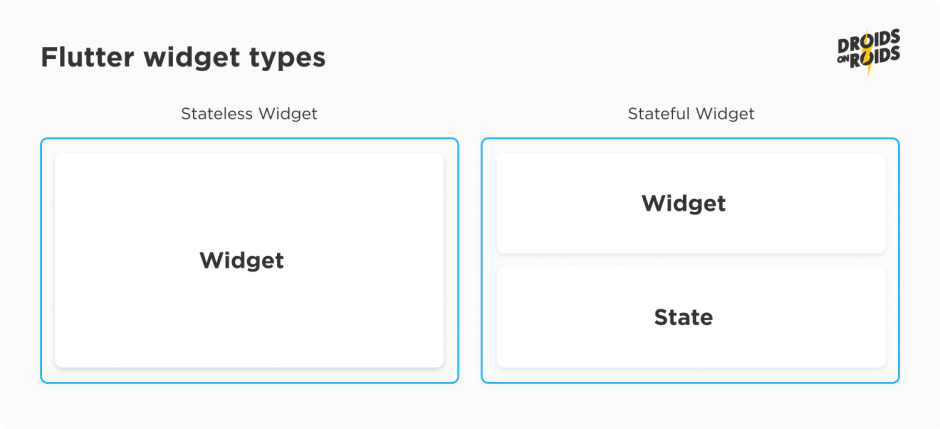
How do Flutter widgets help in mobile app development?
Flutter provides a rich collection of pre-built widgets that cover a wide range of UI components, layouts, animations, gestures, and more. These highly customizable widgets allow developers to adjust their properties and styles to achieve the desired look and behavior.
Additionally, Flutter enables developers to create custom widgets by combining existing widgets or by subclassing StatelessWidget or StatefulWidget to suit specific UI requirements.
The widget-based architecture of Flutter contributes to its flexibility, reusability, and ease of building complex user interfaces. It allows developers to create visually appealing and interactive applications by composing and arranging widgets to form a coherent and cohesive user experience.
Do you want to go beyond widgets? You can also read about Practical Fragment Shaders in Flutter.
How is Flutter supported?
Flutter benefits from a robust support ecosystem consisting of the active Flutter community, Google’s ongoing commitment, comprehensive documentation, frequent updates, third-party packages, developer tools, and community events. This ecosystem empowers developers with the necessary resources and assistance to thrive in their mobile app development projects.
Community Support: Flutter has a large community of developers who are ready to assist each other. The community regularly uses sites like Stack Overflow, GitHub, and others to discuss, ask questions and share resolutions for various problems. The Flutter community also contributes to the Flutter plugin ecosystem, creating and maintaining packages that extend Flutter’s capabilities.
Flutter GitHub Repository: Google developers and the community are actively maintaining Flutter. The GitHub repository allows developers to submit issues, contribute to the project, and see upcoming features and changes. Google’s commitment to the project is clear from the frequent updates and fixes provided.
Google’s Involvement: The company actively supports Flutter’s development and maintenance, utilizing it in their own applications like Google Pay and Google Ads. They regularly update Flutter with new features, improvements, bug fixes, and enhancements, ensuring its quality and empowering developers.
Official Documentation: Google provides comprehensive documentation, which includes many samples, example codes, videos, and detailed API docs. These resources help developers understand the framework.
Events and Meetups: Google and Flutter communities organize events and meetups worldwide, like Flutter Engage, to discuss Flutter’s updates, the roadmap and to engage with the developer community.
Training and Tutorials: Besides official documentation, there are many training courses, tutorials, and articles available online. Websites like YouTube, Udemy, Coursera, and many others provide detailed Flutter courses that can benefit beginners and advanced Flutter developers.
Flutter Forum: The Flutter Forum is a platform where developers can discuss and share their experiences, issues, and solutions. Google’s Flutter team also actively engages with the community, addressing issues, responding to queries, and seeking developer feedback. They participate in forums, GitHub discussions, and community platforms to provide assistance, gather insights, and foster a collaborative environment.
Packages and DevTools: Flutter thrives on community-contributed packages, enhancing its stable support functionalities for networking, databases, and more. pub.dev hosts a wide collection of packages for easy integration. Flutter DevTools provide debugging, profiling, and performance analysis features, optimizing app development with insights on UI rendering, widget trees, network requests, and memory usage.
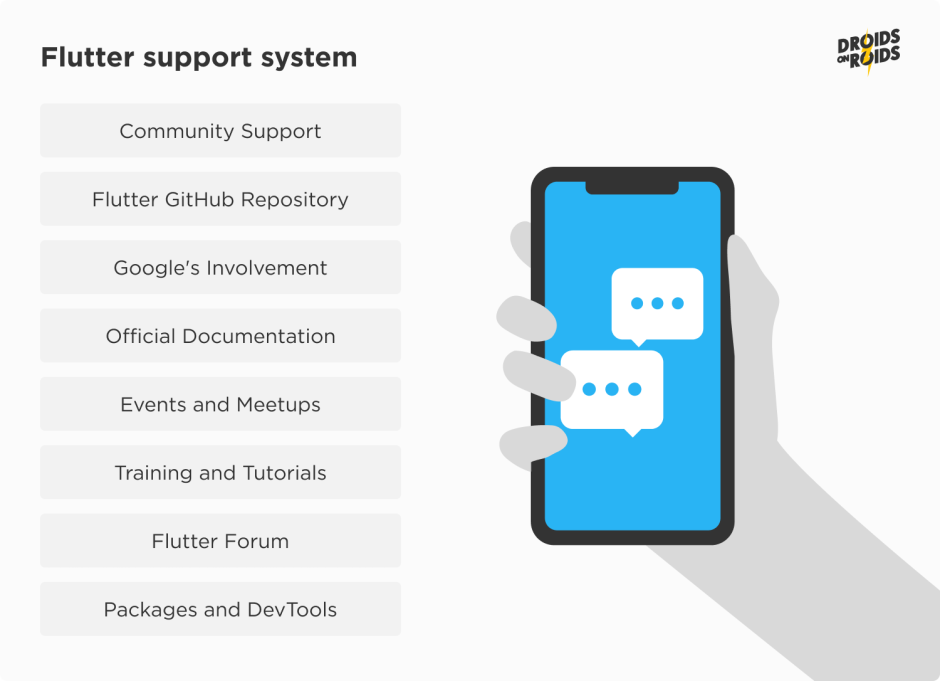
What businesses should use Flutter?
Flutter provides an array of benefits that, in our experience, make it a versatile tool for any business. Regardless of your company’s size, industry, or stage of maturity, what truly matters is the vision for your application. Here, you can find a selection of top-notch applications developed using Flutter, showcasing a rich diversity of products. As you’ll notice, the potential for creating with Flutter is expansive and tailored to suit unique business needs.
Here is what Flutter will help you achieve:
- Slash your development expenses
- One code, three platforms (Android, iOS, web)
- Reach more with a leaner team
- Say goodbye to high maintenance bills
Certainly, there are situations where Flutter may not be the perfect fit. For instance, if your business primarily serves a customer base that strongly favors a particular operating system, it could be more cost-effective and quicker to develop a native mobile application instead.
Moreover, Flutter may not be the most optimal choice for solutions that significantly depend on unique platform functionalities or require low-level interfacing with external devices. The more platform-specific functions that need individual development, the less advantageous Flutter might become.
What is Flutter used for?
Flutter’s primary use is to develop apps that work cross-platform (on iOS and Android). However, you can use Flutter to also create apps for other platforms, such as the web, desktop, and embedded devices. Flutter allows developers to write a single codebase that can be deployed to multiple platforms, reducing development time and effort. It provides a rich set of UI components, excellent performance, and a hot-reload feature for fast iteration and development.
Flutter can also be a good solution during the development of:
- Cross-platform mobile apps
- Single-page or multi-page apps
- Desktop apps
- Progressive web apps (PWAs)
- Simple 2D games
- Prototypes and MVP
- IoT and embedded systems
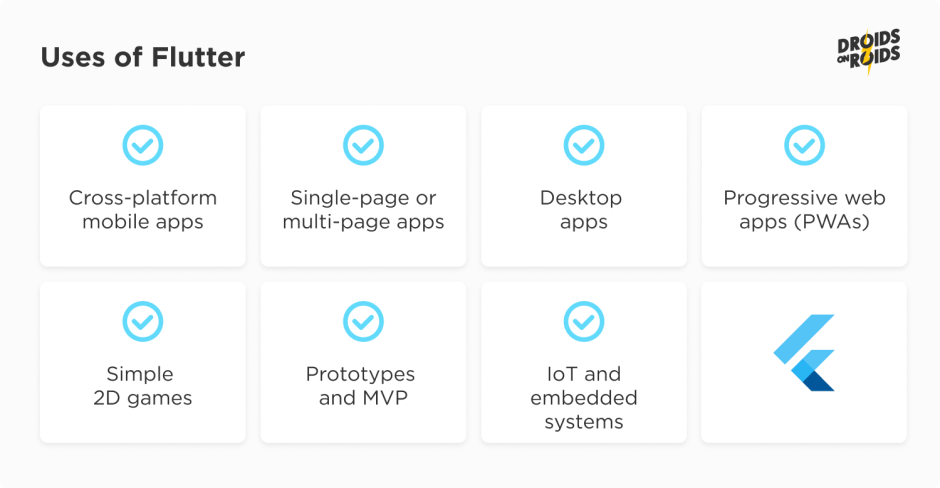
Why should you consider Flutter for app development?
Flutter application development revolutionizes the application development process by providing a robust SDK (Software Development Kit) and comprehensive tools that deliver a wide range of benefits.
✅ Single codebase, limitless reach
Being cross-platform, Flutter allows you to build a product using the same codebase for multiple platforms. But it goes beyond simple iOS and Android apps, reaching web development and more.
As such, Flutter supports seven different platforms (making it an absolute champion among other frameworks):
- Android
- iOS
- Google Fuchsia
- Web platform
- Linux
- macOS
- Windows
As a result, you basically get to access any script with a single-codebase Flutter application. No wonder developers love Flutter!
✅ Industry versatility
You don’t really need to worry about a specific industry if you’re considering Flutter for your next app development project – it’s pretty universal.
After several years on the market, Flutter has come out of early development and has introduced stable versions for all leading platforms.
Its maturity and stability is confirmed by a growing number of implementations in serious industries such as banking, finance and e-commerce.
The most obvious benefit is also the most important one: Flutter allows you to address web and mobile app development at the same time. But, of course, there’s more to Flutter applications that this.
Read also: Flutter App Development and Agile Processes – It’s a Match!
✅ Unparalleled User Interface
Flutter is a modern framework that renders widgets and utilizes basic building blocks to provide an outstanding UI optimized for the end-user.
Simply put: it’s beautiful.
There’s a good chance that Dart is the one programming language that puts quite such an emphasis on looks as the Flutter framework requires, ensuring that Flutter users get the best frontend experience.
✅ Lower development costs
As a rule, cross-platform apps are already cheaper than native ones.
Read also: Native and cross-platform app development: all you need to know as an entrepreneur
But Flutter takes this price-quality ratio to the next level, as it allows you to build apps for several platforms simultaneously while maintaining native-like performance.
At the same time, you’ll be saving time and money not only on the application development process, but also all the related QA testing.
✅ Speed of app development
Not only is it cheaper to build cross-platform apps with Flutter, it is also faster.
A single Flutter team working on a single source code can develop and update applications for several platforms.
This significantly increases the efficiency of the team, simplifies the application development management and reduces the number of specialists needed to achieve business goals.
The same is true about testing.
As a result, with Flutter, you can have two native-like mobile apps in a shorter amount of time.
✅ Simple scalability
Scalability is one of the main benefits of the framework. A single Flutter team can efficiently use the same code to build a version of your application for any supported additional platform at any time in the future.
That makes it much easier to grow your business, expand, and conquer new markets than with native technology. It also significantly increases the business value of your Flutter app.
✅ Future-oriented solution
It won’t be too much of a stretch to say that the biggest benefit of choosing Flutter is Google, the company behind the solution. They have emphasized many times that there’s a specific plan in motion to develop this technology even further.
So, with a little bit of luck, Flutter will be able to remove the current need to have multiple applications for multiple platforms.
This support allows us to count on the increasing capabilities of Flutter applications and the consecutive business benefits in the nearest future.
Read also: Pros and Cons of Flutter App Development
Flutter in Droids On Roids
Flutter is one of those solutions we had an interest in from its very beginning, and as we learned, we saw more and more potential in it. With 16 experts on board and having developed several apps with this framework, we can confidently say it’s the best way to create cross-platform solutions from a single code base.
Our portfolio includes long-term projects such as NTFY – Nice To Fit You, a mobile commerce application for one of the largest dietary caterers in Poland. We have also already done several web projects with Flutter, which very few companies have experience with yet. Moreover, our team organizes a Flutter meetup where we share our knowledge.
Our clients are very happy with our Flutter App Development services as we prioritize transparency, honesty, and expertise. They trust us because we are open and straightforward in our communication, ensuring that they are fully aware of the progress and challenges throughout the development process. With our deep understanding of Flutter and its capabilities, we know how to navigate the development journey and deliver exceptional results. Here are some of our clients’ reviews:
Droids On Roids guided us in building the best product in its category. The NTFY app won 1st place in the Mobile Trends Awards’ Foodtech category!
What’s more, our Flutter app has a huge impact on our business:
- 250% higher user return rate vs web
- 50% higher conversion rate vs web
- 70% of all orders are made through the app
Numbers don’t lie. With the power of Flutter, we’ve created a top-notch app.
For businesses striving to evolve, Flutter is an ideal solution. It simplifies further app development and reduces costs compared to maintaining two native apps. Thanks to Flutter and the expertise of Droids On Roids, we stayed within our budget and met our deadlines for developing the Greenr app.
With Flutter, leveraged by experts at Droids On Roids, we save time and money without compromising on the quality of our mobile product. What’s more, everything about Droids On Roids is extraordinary. They give feedback where it is needed, but they focus on designing the solution that’s in your head, not theirs.
Summary – why is everyone talking about Flutter?
Even though Google’s framework has been around for a few years now, the question ‘what is Flutter?’ keeps popping up. No wonder, since Flutter’s fame beats even React Native. But why is it getting so much attention? It’s Flutter’s ability to streamline application development across multiple platforms with a single codebase.
Everyone is talking about Flutter because it delivers fast performance, vibrant user interfaces, and quick time to market for apps. Its unique approach to design and efficiency is revolutionizing the way developers, and enterprises think about mobile application development.
So, if you’re a Product or App Owner looking for the best solution to build your next app, remember that it doesn’t hurt to at least consider Flutter, as it could give you great results. And even if it turns out that another framework is better for this project, why not come back to Flutter in the future for your other app? Tell us about your idea!
About the authors
Hire Experienced Flutter Developers to Create Your Next App
Together, we will get your project off the ground and achieve amazing results







